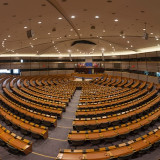Human Rights in EU
All human rights and fundamental freedoms are universal but everyone has also duties towards the community, in which alone the free and full development of his or her personality is possible.

The European Union is committed to supporting democracy and human rights in its external relations, in accordance with its founding principles of liberty, democracy and respect for human rights, fundamental freedoms and the rule of law. The EU seeks to mainstream human rights concerns into all its policies and programmes, and has different human rights policy instruments for specific actions — including financing specific projects through its financing instruments.

Despite mixed fortunes at the polls, radical right populists continued to shape much of the debate around migration, as EU institutions and governments pursued migration policies that too often exposed people to violence and abuse and denied them access to asylum, especially by keeping them outside EU borders. There were serious illegal and violent push-backs of migrants by Croatian police, increase in intolerance, racial and religious hatred and xenophobia, and the role of political leaders and members of Italian government, French police crowd control and anti-riot tactics that injured thousands of people during the protests and Roma continue to be one of the most marginalised communities in Europe.

During a time where international law, bodies and mechanisms came under increasing attack by powerful countries including the United States, Russia and China, the European Union remained a staunch defender of multilateralism and a rules-based global order, despite internal divisions and resistance from individual EU members that sometimes led to muted positions or displayed EU double standards.

EU institutions maintain scrutiny of the conduct by EU governments that threaten the rule of law and human rights. There was modest progress in proceedings against Poland and Hungary under article 7, the political sanctions mechanism of the EU treaty for addressing such threats. Seven member states and the EU have yet to ratify the Istanbul Convention. Racist intolerance, xenophobic, Islamophobic, and anti-Semitic sentiment and violence are still prevalent across the EU.

EU member states continue their deliberations on the adoption of a “global EU human rights sanctions regime” that would allow the EU to target individuals and entities responsible for serious violations of international human rights and humanitarian law, without adopting country-specific sanction regimes.The unanimity rule in EU at times proved to be an insurmountable obstacle and creative solutions have to be found.
Quote
To deny people their human rights is to
challenge their very humanity.
-- Nelson Mandela